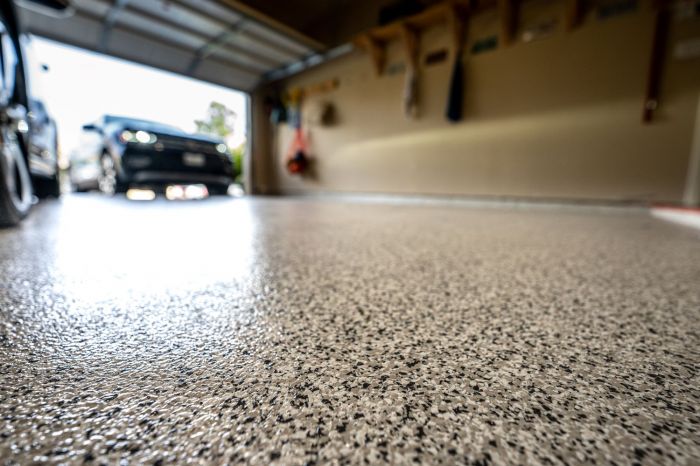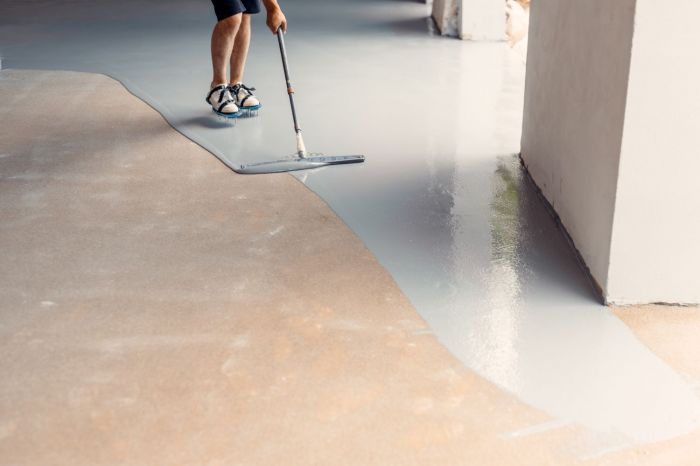
Your garage has probably seen a lot of heavy tasks that take a great toll on its floor. It's time to upgrade that neglected space and create a showpiece you can be proud of. The answer lies in a new floor coating made for garages.
Garage floor coatings are the ultimate two-for-one deal. Not only do they turn a dull, gray slab into a vibrant, freshly-paved surface, but their protective barriers also prevent stains, cracks, hot tire marks, and other damage. Thanks to professional coating systems by Renuity, your garage can morph from a dingy catchall into a clean, usable extension of your home.
With so many varieties on the market, finding the perfect coating makes all the difference. Let's explore the top options to ensure your garage receives the royal treatment it deserves.
Rolled Epoxy Coatings
The king of garage floors, epoxy commands respect with its remarkable toughness. This two-part system chemically bonds to concrete at the molecular level for incredible durability. Epoxy laughs at scuffs, oil, chemicals — even road salt and battery acid meet their match. Best reserved for the serious DIYer, these thick coatings create a seamless, glossy finish that elevates any garage.
For all its brawn, epoxy coatings aren't cut out for hot tires or heavy loads. But with scores of coloring options from speckles to metallics, they bring luxurious depth to complement your home's exterior. Take advantage of customized color chips, quartz blends, or even logos for a truly personalized garage.
And the visual appeal doesn't stop at glossy solids. Today's trend-setting epoxy coatings incorporate vibrant colors blended with high-tech effects like tinted metallics. Think glittering charcoal flecked with iridescent silver highlights. Or maybe you'd prefer a dreamy blue with coppery orange undertones swirled throughout? With expert installers at the helm, creative works of art emerge underfoot.

Polyurea Polyaspartic Coatings
When it comes to cutting down cure times, polyurea and polyaspartic coatings have epoxy beaten. These chemical compounds don't mess around, hardening in mere hours instead of days. Move those cars back in lickety-split!
Their rapid-setting schedule is perfect for garages that need to hit the ground running after installation. Plus, polyurea and polyaspartic options are at least 20 times thicker than epoxy, creating coveted protection from hot tires or heavy machinery. Add their excellent resistance against abrasion, chemicals, and UV rays, and you've got a floor tailored for any busy garage.
While they may cost more than epoxy out of the gate, the incredible longevity makes these premium options worthwhile investments in the long run. Polyurea and polyaspartic floors easily last 10-15 years before requiring re-coating. Just be prepared for a lower-luster satin or matte finish compared to epoxy's signature high gloss.
Acrylic Sealers and Paints
We're all familiar with latex floor paints and clear concrete sealers — the DIY standards that fight oil stains and add a welcome pop of color. When life demands an inexpensive, no-frills solution, acrylic products are quick, budget-friendly ways to spruce up faded garage floors.

That said, they simply can't compete with the defenses of an epoxy or polyurea coating. Susceptible to hot tires, heavy impacts, chemicals, and UV rays, acrylic sealers, and paints are best suited for low-traffic areas without much abuse. Consider them the gateway product to more robust coatings later on when your budget or needs expand.
Still, acrylics do help rejuvenate dull concrete for the short term. And pint-sized projects like utility rooms or modest workshops are perfect candidates for these affordable one-coat solutions. Just don't expect miracles when it comes to longevity — most will start showing wear within 2-3 years. A new application every couple of seasons helps keep everything fresh.
DIY vs. Professional Installation
With any garage floor coating, proper installation is non-negotiable. Sloppy prep leads to peeling, flaking, and all manner of delamination down the road. Successful application requires meticulously grinding the concrete, carefully mixing two-part compounds at precise ratios, and ensuring a dust-free, moisture-free environment during curing. Any oversight is a recipe for callbacks and redos.
While premium epoxy and polyurea/polyaspartic coatings aren't impossible for the experienced DIYer, missteps can ruin an otherwise stellar product. Professional contractors are trained in critical aspects like surface profiling, mixing techniques, coating thicknesses, cure times, and so on. They also come equipped with commercial-grade tools and equipment to produce flawless, warrantied results that amateur efforts can't match.
For acrylics and one-part coatings, the DIY path presents fewer hurdles. As long as you study best practices and have some know-how, installing these systems is an achievable weekend project for most homeowners. Don't forget safety gear, though — concrete grinding fills the air with hazardous silica dust.
To sum up, every garage has its own needs, whether sheltering project cars, withstanding heavy machinery, or simply cleaning up a multipurpose area. That's why choosing the right coating is crucial. Mull over your unique requirements — traffic levels, moisture presence, aesthetic preferences — then invest in the solution offering the perfect middle ground of performance and cost. With a little research and quality installation, your garage will deliver radiance for years to come.









